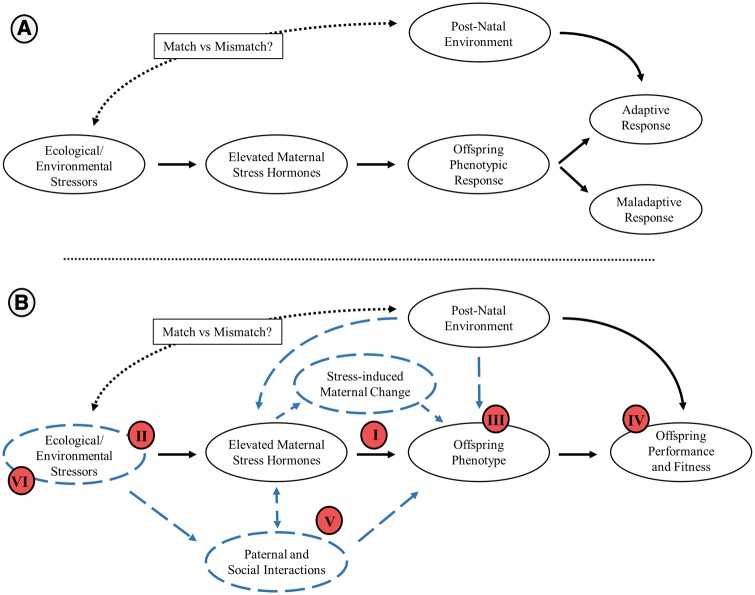Fig. 1.
The potential pathway of an ecological/environmental stressor on offspring performance and fitness, acting through maternal stress effects. (A) Generally it is thought that an ecological or environmental stressor will increase maternal stress hormones, which in turn will alter offspring phenotype in an adaptive or maladaptive manner depending upon the post-natal environment experienced by the offspring. (B) Building upon this general framework we propose many avenues of future research that may provide novel insights into our understanding of maternal stress effects (highlighted by the blue hashed lines). (I) Although traditionally thought that maternal stress effects were controlled by the mother and her hormone levels, there is new emerging evidence that offspring may play a significant role in this relationship. Further, maternally-derived stress hormones may not be the only mediator of this relationship. (II)The ecological and environmental stressors experienced by the mother are likely dynamic in nature, and may change how and when mothers perceive and respond to them. (III) Offspring’s phenotypic response does not occur along a single axis, but may be a sex-specific integration of their behavioral, physiological, and morphological changes. Changes that do not stop at birth/hatching but likely continue through development, being influenced by both pre-natal and post-natal cues. (IV) To fully appreciate the adaptive value of maternal stress effects, the offspring phenotype’s performance and fitness must not only be considered within the ecological context it occurs but its relative value among both stressful and unstressful future environments must be compared. (V) In many cases mothers and offspring do not exist in a simple dyadic relationship, but may be part of a larger social unit that may influence the mother–environment and mother–offspring relationship. Further, new evidence is emerging on the influence of paternal and grandparental stress effects that may themselves directly influence offspring phenotype. (VI) Lastly, maternal stress effects may play a critical role in how organisms respond to a changing world. Maternal stress effects may result in evolutionary traps if mothers do not perceive novel stressors as stressful or if they perceive unstressful events as stressful. Alternatively, maternal stress effects may increase the magnitude of an adaptive response if environmental changes lead to an increase within the mean of variation of a known stressor. Clearly, there is much work to be done in this exciting field.

